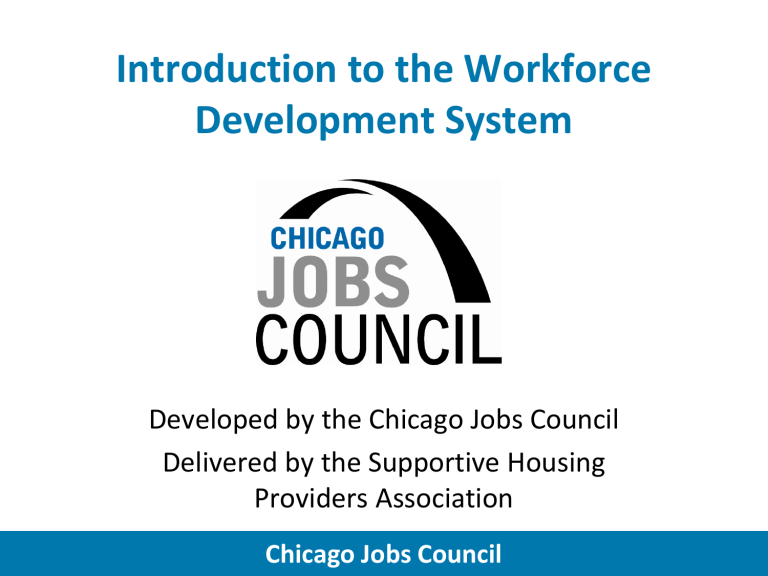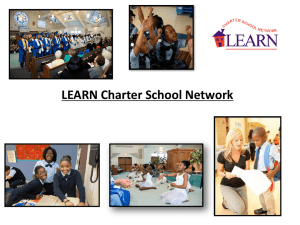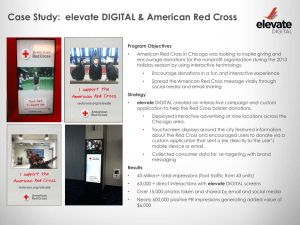Chicago Jobs Council - Supportive Housing Providers Association

Introduction to the Workforce
Development System
Developed by the Chicago Jobs Council
Delivered by the Supportive Housing
Providers Association
Chicago Jobs Council
Agenda
• Introductions
• What is the Workforce Development System?
• Program Models / Services for Job Seekers
• Funding Sources
• Challenges and Opportunities
Chicago Jobs Council
What is the Workforce
Development System?
Chicago Jobs Council
What is the Workforce
Development System?
• Assists disadvantaged individuals prepare for, find, and remain engaged in employment
• Network of community-based organizations, training providers, and other institutions
• Funded by a variety of sources
Chicago Jobs Council
Workforce Development:
Intersections with Other Systems
• Community Colleges
• Adult Education (Literacy, ESL, GED prep)
• Economic Development
• Human Services
Chicago Jobs Council
Who does the Workforce
Development system serve?
• Youth (in-school and out-of-school)
• People with criminal records
• Public housing residents
• Veterans
• Homeless individuals
• TANF recipients
• Unemployment Insurance recipients
• Individuals with limited English proficiency
• Low-wage incumbent workers
Chicago Jobs Council
Program Models / Services for Job Seekers
Chicago Jobs Council
Transitional Jobs (TJ) Programs
• Aimed at individuals with limited labor market experience (i.e. ex-offenders, public housing residents, older youth)
• Time-limited, wage paying (subsidized) employment
– Real work experience
– Extensive support services and case management
– Job readiness/ soft skills
– Assistance transitioning to unsubsidized employment
Chicago Jobs Council
Transitional Jobs (TJ) Programs
• Types of TJ Program Models
– Individual placement
– Work crews
– Social enterprise
Chicago Jobs Council
“Bridge” Educational Strategies
• Goal: increase education levels of individuals so they can succeed in post-secondary education and/or career path employment
• Remedial instruction beginning at low literacy / numeracy levels, contextualized to an occupation
• No dedicated funding stream or programAdult Basic
Education, WIA Title I, Community Development Block Grant, private funding braiding of several funding sources
Chicago Jobs Council
“Bridge” Educational Strategies
• Definition adopted by Illinois Community College
Board (ICCB) and Illinois Department of Commerce &
Economic Opportunity (DCEO)
• 3 main “bridge” program components
• Components are mandatory; without one it’s not a
“bridge” program
Chicago Jobs Council
Illinois Definition of Bridge
Program: 3 Core Elements
• Contextualized instruction that integrates basic reading, math, and language skills with occupational knowledge
• Career Development that includes career exploration, career planning, and understanding of the world of work.
• Transition Services that provide students with the information and assistance they need to successfully navigate the process of moving from adult education to credit or occupational programs.
Chicago Jobs Council
Bridge programs in the field
• Successful bridge programs can be offered by a range of entities
– Community based organizations
– Community colleges
– Partnerships between CBOs and community colleges
Chicago Jobs Council
Sector-based Training
• Training developed in conjunction with an employer to ensure it meets industry standards
• Designed to prepare participants for particular occupations within a high demand industry
• Chicago has focused on manufacturing, IT, healthcare, and hospitality (among others)
Chicago Jobs Council
Employment Prep & Placement
• Basic workplace skills
• Communication and problem solving skills
• Resume and cover letter writing
• Interviewing skills
• Basic computer skills
• Job search and placement assistance
• Potential referral to sector training program
• Follow up services to ensure employment retention
Chicago Jobs Council
Adult Basic Education (ABE)
• Provides basic education services to adults
• English as a Second Language
• Literacy
• GED preparation
• Contextualized ABE a part of bridge programs
• Recently there has been increased conversation about enhancing linkage between these services and workforce development
Chicago Jobs Council
Support Services
• State ID
• Obtain criminal record
• GED registration fee
• Licensing fee / exams
• Glasses
• Books / materials for training
• Referrals to other social services
• Transportation
• Child care
• Dependent care
• Housing
• Access to voicemail
• Clothing / uniforms
• Legal assistance
Chicago Jobs Council
Workforce Development
Funding Sources
Chicago Jobs Council
Workforce Investment Act
(WIA) Title I
U.S. Department of Labor
Employment & Training
Administration
Illinois Dept. of
Commerce & Economic
Opportunity
Local WIA
Administrator
Chicago Jobs Council
Workforce Investment Act
(WIA) Title I
• Dual customer: job seeker and employer
• Serves low-income adults, low-income youth,
& dislocated workers
• Performance outcomes: job placement, job retention, wages, attainment of degree/certificate, literacy & numeracy gains
Chicago Jobs Council
Eligibility and Suitability
• Adult: 18 years and older; low-income (very)
• Dislocated Worker: unemployed and unlikely to return to occupation; received a layoff notice or have been laid off due to a company closure or mass layoff; self employed but currently unemployed
• Youth: 16-21 years; low-income; barrier(s) to employment
• Suitability: May be referred to appropriate educational entity, bridge program, other workforce development program, or social service agency upon assessment
Chicago Jobs Council
Types of WIA Services
• Universal: general orientation, eligibility assessment, job search activities, basic workshops, labor market information
• Intensive: job readiness skills, comprehensive assessment, individual employment plan, workshops on interviewing, resumes, job search
• Training: industry-specific occupational training,
Individual Training Accounts (ITAs)
• Must be suitable and eligible for WIA program to access intensive and training services.
Chicago Jobs Council
WIA
Network http://www.ildceo.net/dceo/bureaus/workforce_developm ent/warn/warn_lwia+regions.htm
Temporary Assistance for
Needy Families (TANF)
• Uses related to workforce development
– Source of flexible funding for training and job placement services (both TANF recipients and non-recipients)
– Pipeline into employment & training services for lowincome parents
• Access to services is through Family Community
Resource Centers (run by IDHS)
Chicago Jobs Council
Workforce Development
Resources
cjc.net
wire.cjc.net
ilworks4 future.org
Chicago Jobs Council greencollar chicago.org
Questions?
Contact information
Lore Baker
Executive Director, SHPA l.baker@shpa-il.org
217-528-9814
Johnna Lowe
Resident Education & Advocacy Coordinator, SHPA j.lowe@shpa-il.org
312-202-0256
Chicago Jobs Council
Thanks!
Chicago Jobs Council








